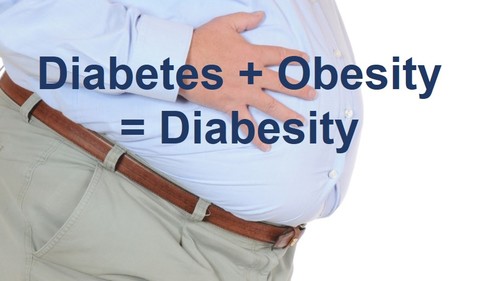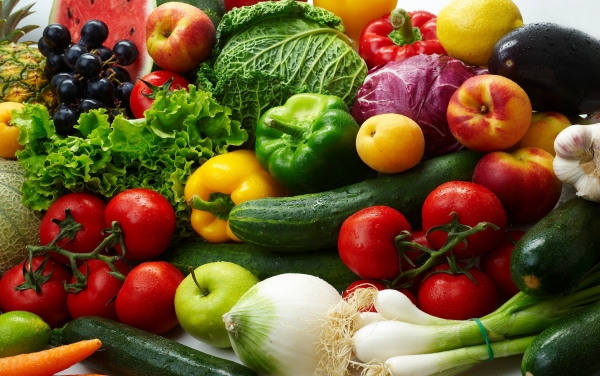Diabesity refers to the link between obesity and diabetes. Obesity trends are on the rise and the odds of a diabetes diagnosis rise dramatically with increasing weight. Several studies show a significant increase in weight for meat- and dairy-eaters compared to sustainable weight loss for those on a vegan diet. So it’s no surprise that vegans weigh significantly less than non-vegans, despite the fact that vegan diets can be higher in calories overall.
It was observed in 1935 that diets high in carbohydrates (carbs) and low in fat resulted in significantly fewer deaths from diabetes than diets lower in carbs and higher in fat. The same trend was seen in World War I when animal food supplies were cut off from Scotland by German submarines. Another study around that time noted that insulin dosages were greatly reduced for diabetic patients placed on a high-carb diet, and in many cases (24%), the insulin was stopped altogether after 5 years. In a study in the late 1970s several diabetic men when placed on a high-carb, high-fiber, low-fat diet completely reversed their diabetes and were completely taken off insulin, after only 3 weeks!
On the other hand, in China, the traditionally more plant-based diet gave way to the introduction of western fast and convenience foods, meat, sugary foods, and soda. Fat consumption increased in China by 15% from 1991-2011 and diabetes doubled twice during that time. What this tells us is that there appears to be a link between diet, weight, and diabetes.
The association between fat and insulin resistance is widely accepted. Fat causes insulin resistance, which occurs when fat in the bloodstream builds up in the muscle, causing insulin to lose its ability to get glucose into the cells, and resulting in a build-up of glucose in the bloodstream (high blood sugar).
A high-fat diet increases levels of fat in the bloodstream and muscles, and is associated with decreased insulin sensitivity. Obesity has the same effect because excess fat that’s stuffed into fat cells literally spills over and back into the bloodstream and muscles. In fact, insulin sensitivity drops in as little as 2 hours on a low-carb diet as fat builds up in muscle tissue. Interestingly saturated fats cause insulin resistance whereas unsaturated fats improve insulin sensitivity.
The opposite happens as the amount of fat in our diet gets lower and lower – insulin works better and better. So we can decrease insulin resistance simply by decreasing the amount of fat in our diet and also by losing weight. Studies have found that fat stored in muscles is significantly lower in vegans than in omnivores (meat- and plant-eaters). A major finding in a study was that vegans are more insulin sensitive, have lower fasting blood glucose and lower insulin levels.
Maybe that’s because whole plant-based vegans eat mainly foods that are lower on the glycemic index (GI), which are digested more slowly and cause only a gradual rise in blood sugar. In this respect, the GI may be a helpful tool for preventing the intake of foods that raise blood glucose, which in turn can help prevent and manage diabetes.
However, consuming only low-GI foods doesn’t necessarily translate into good health. For example, diets that are low in carbs and high in meat and dairy (high protein and fat) are also low on the GI index. Problems with this approach include the link between high fat intake and insulin resistance as well as the known links between animal foods, cancer, and heart disease.
On the other hand, staying low on the GI by consuming higher-protein, low-GI carbohydrate-rich foods such as beans and whole grains can have a positive impact on insulin resistance as these foods are high in fiber, which slows digestion and thereby stabilizes blood sugar.
It was observed in 1935 that diets high in carbohydrates (carbs) and low in fat resulted in significantly fewer deaths from diabetes than diets lower in carbs and higher in fat. The same trend was seen in World War I when animal food supplies were cut off from Scotland by German submarines. Another study around that time noted that insulin dosages were greatly reduced for diabetic patients placed on a high-carb diet, and in many cases (24%), the insulin was stopped altogether after 5 years. In a study in the late 1970s several diabetic men when placed on a high-carb, high-fiber, low-fat diet completely reversed their diabetes and were completely taken off insulin, after only 3 weeks!
On the other hand, in China, the traditionally more plant-based diet gave way to the introduction of western fast and convenience foods, meat, sugary foods, and soda. Fat consumption increased in China by 15% from 1991-2011 and diabetes doubled twice during that time. What this tells us is that there appears to be a link between diet, weight, and diabetes.
The association between fat and insulin resistance is widely accepted. Fat causes insulin resistance, which occurs when fat in the bloodstream builds up in the muscle, causing insulin to lose its ability to get glucose into the cells, and resulting in a build-up of glucose in the bloodstream (high blood sugar).
A high-fat diet increases levels of fat in the bloodstream and muscles, and is associated with decreased insulin sensitivity. Obesity has the same effect because excess fat that’s stuffed into fat cells literally spills over and back into the bloodstream and muscles. In fact, insulin sensitivity drops in as little as 2 hours on a low-carb diet as fat builds up in muscle tissue. Interestingly saturated fats cause insulin resistance whereas unsaturated fats improve insulin sensitivity.
The opposite happens as the amount of fat in our diet gets lower and lower – insulin works better and better. So we can decrease insulin resistance simply by decreasing the amount of fat in our diet and also by losing weight. Studies have found that fat stored in muscles is significantly lower in vegans than in omnivores (meat- and plant-eaters). A major finding in a study was that vegans are more insulin sensitive, have lower fasting blood glucose and lower insulin levels.
Maybe that’s because whole plant-based vegans eat mainly foods that are lower on the glycemic index (GI), which are digested more slowly and cause only a gradual rise in blood sugar. In this respect, the GI may be a helpful tool for preventing the intake of foods that raise blood glucose, which in turn can help prevent and manage diabetes.
However, consuming only low-GI foods doesn’t necessarily translate into good health. For example, diets that are low in carbs and high in meat and dairy (high protein and fat) are also low on the GI index. Problems with this approach include the link between high fat intake and insulin resistance as well as the known links between animal foods, cancer, and heart disease.
On the other hand, staying low on the GI by consuming higher-protein, low-GI carbohydrate-rich foods such as beans and whole grains can have a positive impact on insulin resistance as these foods are high in fiber, which slows digestion and thereby stabilizes blood sugar.
The bottom line is that a whole food plant-based diet that’s low-fat and low-GI consistently results in weight loss, lower blood sugar, improved insulin sensitivity, and is sustainable. In other words, it eliminates the “diabesity” factor. And according to Neal Barnard, MD, “That’s really the healthy prescription for type 2 diabetes.”
References
References
- Barnard ND, Levin SM, Yokoyama Y. A systematic review and meta-analysis of changes in body weight in clinical trials of vegetarian diets. J Acad Nutr Diet. 2015; 115(6): 954-969.
- Berkow SE, Barnard N. Vegetarian diets and weight status. Nutr Rev. 2006;64:175-88.
- Huang RY, Huang CC, Hu FB, Chavarro JE. Vegetarian diets and weight reduction: a meta-analysis of randomized controlled trials. J Gen Int Med. 2015.
- Mokdad AH, Ford ES, Bowman BA, et al. Prevalence of obesity, diabetes, and obesity-related health risk factors, 2001. JAMA. 2003;289:76-9.
- Obesity trends among U.S. adults between 1985 and 2010. Centers for Disease Control and Prevention website. www.cdc.gov/obesity/downloads/obesity_trends_2010.ppt. Accessed February 3, 2016.
- Vergnaud AC, Norat T, Romaguera D, et al. Meat consumption and prospective weight change in participants of the EPIC-PANACEA study. Am J Clin Nutr. 2010;92:398-407.
- Himsworth H. Diet and the incidence of diabetes mellitus. Clin Sci. 1935; 2: 117-148.
- Anderson JW, Ward K. High-carbohydrate, high-fiber diets for insulin-treated men with diabete mellitus. Am J Clin Nutr. 1979 November; 32(11): 2312-2321.
- Barnard RJ, Lattimore L, Holly RG, Cherny S, Pritikin N. Response of non-insulin dependent diabetic patients to an intensive program of diet and exercise. Diabetes Care. 1982 Jul-Aug; 5(4): 370-374.
- Rabinowitch IM. Effects of the high carbohydrate-low calorie diet upon carbohydrate tolerance in diabetes mellitus. Can Med Assoc J. 1935 Aug 33(2): 136–144.
- Gu D, Reynolds K, Wu X. Prevalence of diabetes and impaired fasting glucose in the Chinese adult population: international collaborative study of cardiovascular disease in Asia (InterASIA). Diabetologia. 2003; 46: 1190-1198.
- Pan X-R, Yang W-Y, Li G-W, Liu J. Prevalence of diabetes and its risk factors in China, 1994. Diabetes Care. 1997 November; 20(11): 1664-1669.
- Xu Y, Wang L, He J, Li M, et al. Prevalence and control of diabetes in Chinese adults. JAMA. 2013 Sep 4; 310(9): 948-959.
- Zhai FY, Du SF, Wang ZH, et al. Dynamics of the Chinese diet and the role of urbanicity, 1991–2011. Obes Rev. 2014 15(Suppl 1): 16–26.
- Sweeney JS. Dietary factors that influence the dextrose tolerance test: a preliminary study. Arch Intern Med (Chic). 1927; 40(6): 818-830.





 RSS Feed
RSS Feed